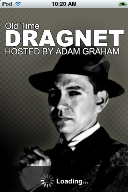“Well, whatddaya know? The immortal sergeant.”
Dragnet 1966 (aka World Premiere) was intended to air in 1966, but instead network executives were so impressed with the new film, they decided give Dragnet a second life as a thirty minute series. The movie ended up airing in 1969. Since then, while the remade series it spawned has been syndicated multiple times, the movie that restarted Dragnet has laid mostly forgotten. No home video releases and rarely playing on television channels.
Taking over future Dragnet releases after Universal’s miserly release of Dragnet 1967, Shout Factory made Dragnet 1968 special with its inclusion of the rarely-seen movie that started it all, as well as a Jack Webb featurette. Seeing the film for the first time last week, I saw what NBC was excited about.
There’s a strong case to be made that Dragnet 1966 is the greatest Dragnet adventure ever. However, there’s an even stronger case to be made that it’s the most complete Dragnet story ever. When people think of the Dragnet series, there are a variety of things that come to mind: 1) solid mysteries, 2) quality human drama, 3) a solid rhetorical blast from Sergeant Friday, 4) police realism, 5) great performances by some of the great characters actors of TV’s golden age, , and 7) Just the right touch of comic relief.
Most thirty minute episodes of Dragnet will leave one of these elements out. There’s just not time to portray everything in thirty minutes, and the Dragnet 1954 movie couldn’t quite put it all together, missing the comic thrust and the solid mystery.
Dragnet 1966 was the total package. It had everything you could hope from Dragnet.
The movie begins with Joe Friday being called back early from vacation and put on a murder case that’s been perplexing the police. Three women have disappeared with foul play suspected. The third victim, a model, offers greater clues to the perpetrator as the police conclude she met the perpetrator through a lonely hearts club and with the help of composite artist, the brother is able to provide a description.
However, Friday and Gannon’s job is complicated by the President of the lonely hearts club (played brilliantly by Virginia Gregg) who provides an entirely different description from the brother, apparently to avoid hurting the club’s reputation. A red herring leads to an unrelated murder investigation. All the while, the man their hunting is looking for his next victim.
Dragnet 1966 is smartly written by Oscar winning screenwriter Richard Breen, who seemed to have a better grasp of what Dragnet should look and sound like than when he penned the 1954 movie and the 1953 Christmas episode.
The cast was made up of the same folks who Webb had relied upon to make the Dragnet radio and TV shows a success. It featured three of the men who had taken turns playing Webb’s partner between the death of Barton Yarborough in December, 1951 and Ben Alexander taking over the role of Frank Smith in September, 1952: Herb Ellis, Harry Bartell, and Vic Perrin. Throw in Virginia Gregg and Olan Soule and Webb and the gang was truly all back together.
As would be the case in the TV series, Harry Morgan (Bill Gannon) brought the comic relief. Gannon is being forced to retire due to health, but wants to see his last murder case to a conclusion, which will require staying one step of the personnel officer, who wants to be sure that no matter what happens, Gannon turns in his badge and signs his retirement papers no later than 4:30 P.M. Gannon also has a nephew in dentistry school that keeps trying (and failing) to fit him Gannon with bridgework.
To top it all off was Jack Webb delivering a career performance. Webb’s portrayal of Friday was a little different from years past. Friday was no longer the trim young police officer in his 20s and finding his way on the force, but rather a veteran who’d seen it all. Friday is still played as being professional, but with a quiet intensity that’s played for great effect during the ”Quirk in the Law” speech and when Friday and Gannon catch up with a couple murder suspects. There’s also a very moving scene with Friday and the son of a murder victim.
Dragnet 1966 holds the viewer’s attention right to the very end with a climax that puts Joe Friday in one of the most dangerous and exciting situations of his career.
I was expecting a lot from Dragnet 1966 and it exceeded even my expectation. Fans owe Shout Factory a debt of thanks for bringing this unheralded classic to home video.
I’ll also that they did a very good job on the 24 minute Jack Webb featurette that included interviews and insight on Webb from veteran Wenb hands Peggy Webber and Herb Ellis, who shared their personal and professional memories of Webb going back to the days of radio, as well as the very funny Tom Williams (who did a great Harry Morgan imitation) and Webb’s third wife, Jackie Loughery. It was very well-put together piece that’s a must-see for Dragnet fans.




